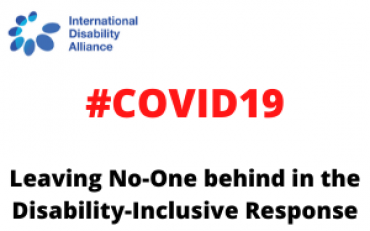This is one story as part of the Voices of People with Disabilities during COVID19 Outbreak series
Names have been changed to protect the individuals mentioned in the story.
The coronavirus pandemic spread to South Africa, with the first confirmed case announced on 5 March 2020 by Minister of Health Zweli Mkhize.
On 15 March 2020, President Cyril Ramaphosa declared a national state of disaster, and announced measures like immediate travel restrictions and the closure of schools from 18 March.
“Schools are often place of safety for children with disabilities”, says Marie.
Marie has been a teacher for 4 years at a school for autistic children South Africa which accommodates students with high support needs, many of qhom are nonverbal. The school, founded in 2015, went from having 45 students back then to 153 and 80 members of staff recently. The age range of the students is 4 to 18 and 80% of them are black students. Marie explains that “in disability there is no space for racism. We are all on the same boat. Disabled people are treated badly no matter the race.” There are 15 boarding students at the school whose families are unable to host them due to socioeconomic situation. However, as the school has closed, they have had to go back to their families, meaning it’s likely that their needs are not being met. “We haven’t received any specific guidelines on autism nor information in accessible formats. Authorities believe that by providing disability allowances, they’re doing enough”, says Marie.
Routine and structure are vital to persons with autism, especially those autistic children with high needs. Parents report their children engage in self injurious behaviour. Currently in South Africa, children are not allowed to leave the house. All parks and play fields are closed. On a very few occasions, children might be granted a permit to walk around the block.
The school has requested permits to the Education Department for children to be allowed to go back to the school. “People are not aware of the implications of children staying at home. They need their freedom”, says Marie. Teachers explain that people in general are not aware of autistic students’ needs and requirements. “Government in general doesn’t understand how bad the situation.”
Moreover, food security in South Africa is one of major threats to the disability community, and food shortages are a main concern. When the school was active, children had breakfast and lunch secured, and food parcels were sent home on Fridays. However, today the school can only send 20 food parcels and they go to those who needed it the most. The disability allowance received by families are not sufficient to support everybody in their house. “Sooner than later, we will have too many starving people.” Food parcels are often being delivered in an illegal way by the teachers, but it is the only way to ensure children are being fed.
The school keeps daily communication with all parents. However, Marie explains autistic children don’t work well with standard work sheets and videos are the preferred method. However, this raises a new issue: not all families and teachers have access to internet. Reopening of schools are being discussed by the authorities “but schools for children with disabilities have not been mentioned once in any document. We don’t even use grades, they haven’t taken into account our curriculum.” Marie explains that the Minister of Education does not consult schools who have students with disabilities, meaning that the “inclusion process is damaged and implementation always falls flat.”
Another concern is that many children make use of a school bus to attend school, and social distancing would be very hard to preserve, as well as inside the school. Also, “there is no information on how to keep children safe from the virus”. For instance, when schools are opened, South African authorities have said children will be screened at the door. Marie wonders, “what happens if they are not allowed in. How do they go back to their families? How can parents come and fetch them if they have to work? What do we do with them?”. In a country which has regions where public transport is very poor, implications can be huge. “Where do children go if they can’t go to school?”

